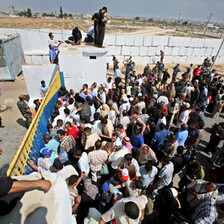The Electronic Intifada 28 November 2007

Gazans protest the Annapolis conference, 27 November 2007. (Iyad Albaba)
“We do not recognize those who hold talks in Annapolis; they do not represent the Palestinian people,” said Ismail Haniyeh, the dismissed Palestinian Prime Minister, in response to the Washington-sponsored Palestinian-Israeli summit in Annapolis.
The streets of Palestine bore witness that it isn’t only the Hamas leader who doesn’t grant legitimacy to the Palestinian negotiating team at the Annapolis conference. On Tuesday, 27 November, large crowds of Palestinians in Gaza poured out of their homes — as did their brothers and sisters in the West Bank — to protest what they call the “renunciation of Palestinians’ legitimate rights.” Critics of the conference held large demonstrations and rallies in the coastal strip, voicing their strongly worded objections to the Annapolis gathering.
“No recognition of Israel! No recognition of Israel!” thousands of Gaza residents chanted in front of the Palestinian Legislative Council (PLC) building in Gaza City.
A young woman taking part in a large women’s rally cried angrily, “We don’t want more alleged peace conferences, which bring us more suffering. We prefer poverty to accepting shameful peace.”
A young man at a nearby rally voiced similar frustration: “What peace are they are talking about? They want us to give up our legitimate rights. We prefer more years of suffering to conceding our rights.”
The speaker of the elected PLC, Dr. Ahmad Bahar, told the crowds, “Today, the Palestinian people tell those meeting in Annapolis that they refuse to concede their inalienable rights.”
Bahar said that the PLC passed a new bill prohibiting the concession of the Palestinian refugees’ right to return as well as the Palestinian nation’s rights to Jerusalem and to resist the occupation.
“This bill is intended to protect Palestinian rights from those who coordinate with the Israeli entity,” the speaker added, referring to President Abbas’ parallel, unelected government that holds talks with Israel.
Many Palestinian bodies, including Hamas, Islamic Jihad, Palestine Liberation Organization (PLO)-linked parties and intellectuals have voiced their objection to the peace summit in Annapolis.
Dr. As’ad Abu Sharekh, a professor of English literature and a political analyst in Gaza, believes that the efforts underway will not lead to real peace.
“This conference should have instead been convened by the United Nations, which has been sponsoring the Palestinian question over the past six decades. The United Nations is the sole body that should implement its long-pending resolutions concerning the Palestinian-Israeli conflict.”
“Resolution 194 of 1949 should be on top of such resolutions, which demands the return and compensation of Palestinian refugees to historical Palestine,” he added.
The Palestinian academic believes that the solution lies in creating one Palestinian state, inclusive of Palestinians and Israeli Jews, on all of historic Palestine.
“These protests against the Annapolis summit are boosting the Palestinian negotiation team. It signals a message of Palestinian consensus over one thing — no to renounciation of the legitimate rights of the Palestinian people,” said Abu Sharekh.
Palestinian President Mahmoud Abbas, who represents the PLO, is taking part in the meeting in the US at a time when the Palestinian territories are divided — geographically and politically — into two camps: Abbas’ Fatah movement seeks to control the West Bank while Hamas holds sway in Gaza.
Palestinian security forces in the West Bank yesterday dispersed crowds of opponents to the peace conference, using force against protesters and journalists — one demonstrator was killed in Hebron and dozens were injured throughout the West Bank.
Protests also took place in other parts of the region as Palestinian refugees in neighboring Arab countries and in the Diaspora voiced their demand for their right of return to historical Palestine, refusing any solution that might threaten that right.
The Annapolis meeting comes after Israel’s recent demand that the Palestinians accept it as an exclusively Jewish state, which would mean dropping the Palestinian people’s right to return, and exposing Palestinian citizens of Israel to further discrimination and possible expulsion.
Before the conference, Washington declared that the Annapolis meeting was intended to restart the Palestinian-Israeli peace process, on the basis of a two-state solution.
The PLO already recognized and signed the Oslo peace deal with Israel in 1993 which fell apart after Israel violated the agreement by, among other things, doubling the number of settlers living in its illegal colonies in the occupied West Bank and Gaza Strip.
In 2000, Washington sponsored the Camp David peace talks that failed to bring about peace after Israel refused to recognize the Palestinian people’s right to return, and to give up major settlements or to relinquish East Jerusalem which it has occupied since 1967.
According to United Nations General Assembly resolution 194 of 1949, Israel must allow Palestinian refugees who were expelled from, or fled their homes and villages during the establishment of the state of Israel, to return to their places of origin and to receive compensation. United Nations’ records suggest that there are almost five million Palestinian refugees, scattered in the Palestinian territories, Jordan, Syria and Lebanon.
In 1967, the United Nations Security Council issued resolution 242 demanding Israel to withdraw from Arab lands it occupied in June 1967, including the Palestinian Gaza Strip and West Bank (including East Jerusalem) and the Syrian Golan Heights.
Israel maintains a tight grip over the Palestinian territories. Jewish-only settlement colonies have been built throughout the West Bank, which has had even more land effectively annexed to Israel through the building of the wall that encompasses as many settlements and as much Palestinian land on the western side of the wall while incorporating as few Palestinians as possible. Meanwhile, in Gaza, the population is enduring a paralyzing economic siege, endorsed by the US, on top of the regular Israeli military bombardments and incursions.
Rami Almeghari is currently contributor to several media outlets including the Palestine Chronicle, aljazeerah.info, IMEMC, The Electronic Intifada and Free Speech Radio News. Rami is also a former senior English translator at and editor in chief of the international press center of the Gaza-based Palestinian Information Service. He can be contacted at rami_almeghari at hotmail.com.
Related Links





